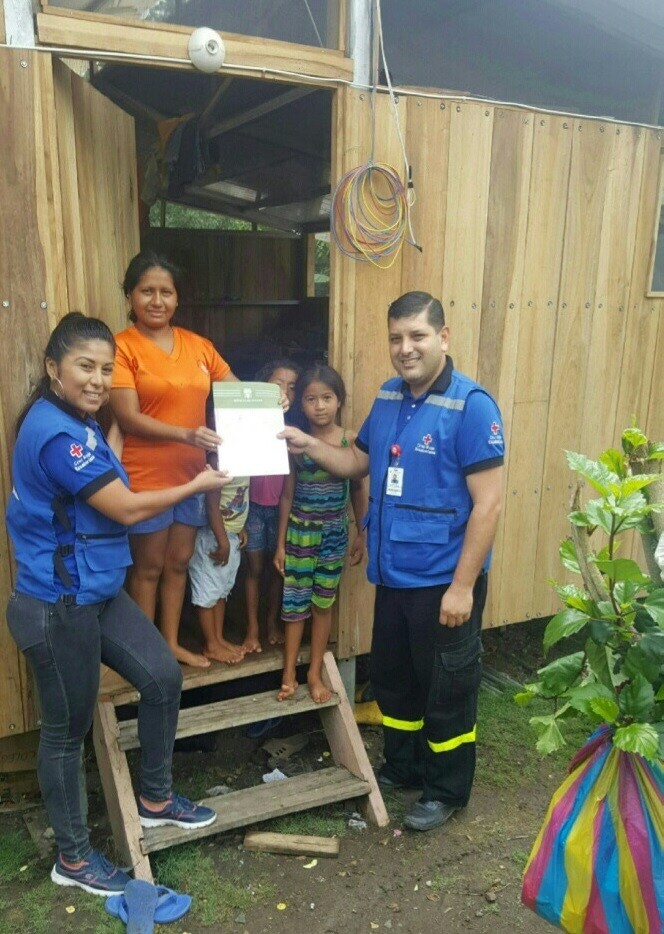
The magnitude 7.8 earthquake that struck coastal Ecuador on 16 April 2016 was one of the biggest the region had ever seen, killing hundreds, wiping out livelihoods and destroying thousands of homes.
A lesser-known impact of a disaster is the legal issues that can arise with housing, land and property. In Ecuador, informal land holdings are quite common and in fact, about 70 per cent of the population does not possess the necessary documentation to prove they own the land they live on. In some cases, people have inherited their land, but it is never properly registered with the relevant authorities. In other instances where land title records were in place, they were lost or destroyed due to the disaster itself.
Those who lost their homes due to the earthquake in Ecuador found themselves disadvantaged when it came to receiving assistance from the government, as reconstruction programs were only directed to formally recognized landowners.
The aftermath: Advocating housing, land and property rights
Following the earthquake in 2016, Ecuador Red Cross worked with communities by setting up workshops in Pedernales to spread awareness housing and land rights and explain basic concepts such as what is a deed, a real estate property and an inheritance.
Diana Rosero, Ecuadorian RC Volunteer, points out that “Although more than 500 people attended the workshops, many were illiterate and initially misunderstood the role of our Red Cross volunteers. This unique situation prompted the NS to modify their methods so that help on basic housing and property terms could reach everyone.”
Support was also provided for people with titles to their homes and land, but with only about 20 per cent of people having the right paperwork, most people were left without support.
In the wake of this reality, Red Cross advocacy efforts were invested in housing, land and property, using experiences from other countries such as Pisco in Peru, to seek a reform of the ministerial agreement to include the bona fide holders of land affected by the earthquake.
Martin Tamayo, Director, International Coordination Directorate, Ministry of Foreign Affairs says “In terms of advocacy, the role of the Red Cross is important because although the State establishes certain priorities, efforts sometimes need to be directed to other critical points due to limited resources – and this is where the Red Cross can help fill the gaps."
Municipalities were asked to review aspects related to land ownership as well as special cases such as communities of ancestral or indigenous peoples, who occupied land for many years without having actual ownership. Part of the National Society’s work was not only to provide housing, but also to ensure housing security by promoting an ordinance in the municipality of Pedernales to regularize the land title of these special cases.
Hugo Cahueñas, IDRL Consultant and Legal Advisor for South America at IFRC, says since the earthquake in 2016, there have been important strides in the Ecuadorian disaster law frameworks.
“We now realise the importance of a solid international disaster response law framework, but also see how disaster can emphasise the need to improve in other disaster law areas, such as housing, which can have a crucial impact in affected communities.”
Ecuador Red Cross leading the way with disaster law
Prior to the 2016 earthquake, the Ecuador Red Cross worked with national authorities to assess the strengths and weaknesses of the national legal and institutional framework for international disaster assistance, using the IDRL Guidelines as a benchmark. The resulting report provided recommendations, which served as the basis for a roadmap to strengthen the country’s legal system for managing international disaster assistance.
Martín Tamayo adds that ‘It is necessary to evaluate and strengthen the regulatory frameworks of international humanitarian aid during the different phases to be applied to improve the risks faced by society and the Ecuadorian state".
This work on IDRL was of great value during response the 2016 earthquake response. This existing awareness and understanding of IDRL issues meant that important legal facilities were provided during the emergency operation. Ecuador's success in implementing IDRL was subsequently featured in the 2017 IFRC Disaster Law report, From Law to Action: Saving Lives through International Disaster Response Law.